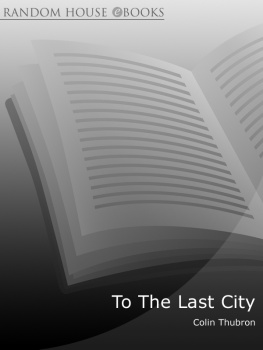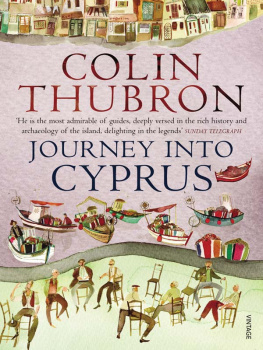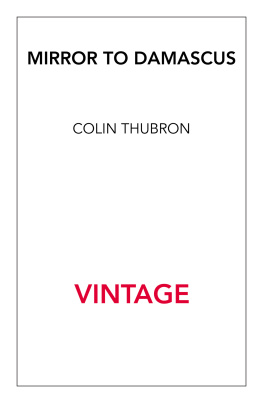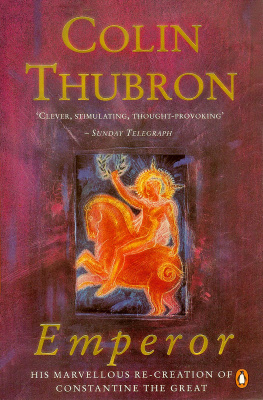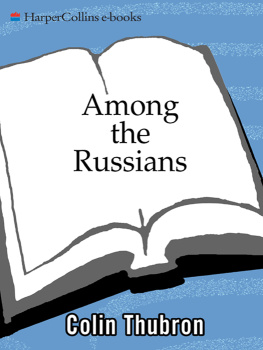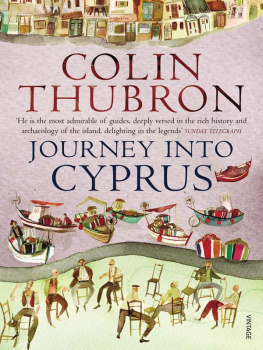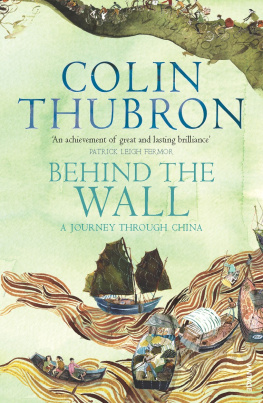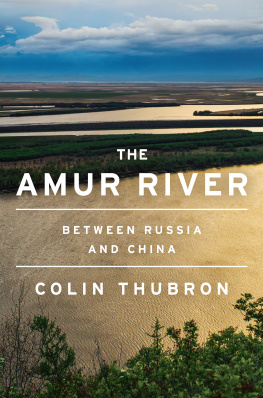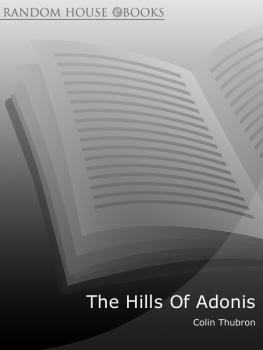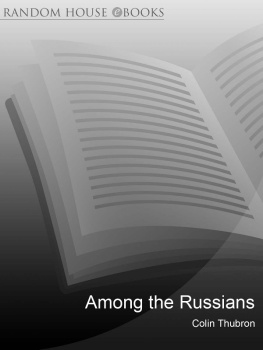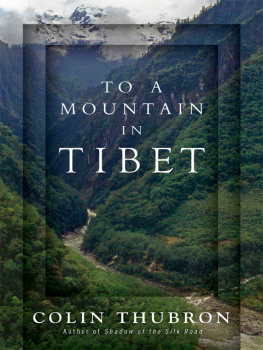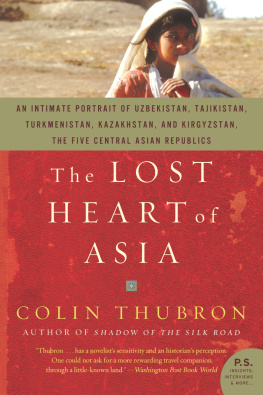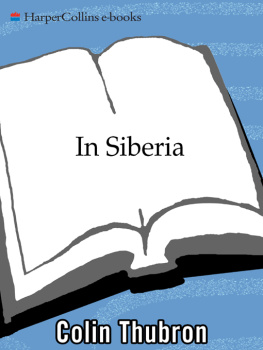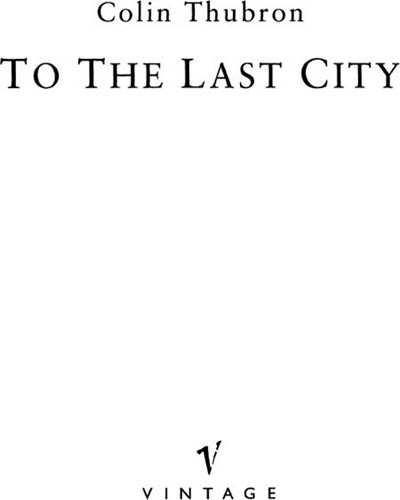Contents
About the Author
Colin Thubron is the author of several classic masterpieces of travel writing, including Among the Russians, Behind the Wall, The Lost Heart of Asia and In Siberia. His fiction titles include A Cruel Madness (winner of the 1985 Silver Pen Award), Falling, Distance, Emperor and Turning Back the Sun.
About the Book
To The Last City is set deep in the Peruvian Andes, where five ill-prepared travellers men and women with different values, temperaments and motives find themselves trekking through one of the most exacting and beautiful regions on earth.
It is a journey which may temper or destroy them. They confront not only their relationships with one another, but also the enigmas of the countrys past, the dangers of its present, and the limitations of their own minds and bodies. The lost city of their destination is Vilcabamba, last refuge of the Inca against the Spaniards, subsumed by jungle for four hundred years.
In this brilliant exploration of the psychological challenges of travelling, set within the exotic jungle of South America, Colin Thubron for the first time joins his highly acclaimed talents as a travel writer with his gifts as a novelist.
ALSO BY COLIN THUBRON
Non-Fiction
Mirror to Damascus
The Hills of Adonis
Jerusalem
Journey into Cyprus
Among the Russians
Behind the Wall
The Lost Heart of Asia
In Siberia
Fiction
The God in the Mountain
Emperor
A Cruel Madness
Falling
Turning Back the Sun
Distance
This ebook is copyright material and must not be copied, reproduced, transferred, distributed, leased, licensed or publicly performed or used in any way except as specifically permitted in writing by the publishers, as allowed under the terms and conditions under which it was purchased or as strictly permitted by applicable copyright law. Any unauthorised distribution or use of this text may be a direct infringement of the authors and publishers rights and those responsible may be liable in law accordingly.
Version 1.0
Epub ISBN 9781446499511
Published by Vintage 2003
6 8 1 0 9 7 5
Copyright Colin Thubron, 2002
Colin Thubron has asserted his right under the Copyright, Designs and Patents Act, 1988 to be identified as the author of this work
This book is sold subject to the condition that it shall not by way of trade or otherwise, be lent, resold, hired out, or otherwise circulated without the publishers prior consent in any form of binding or cover other than that in which it is published and without a similar condition including this condition being imposed on the subsequent purchaser
First published in Great Britain in 2002 by Chatto & Windus
Vintage
Random House, 20 Vauxhall Bridge Road,
London SW1V 2SA
Random House Australia (Pty) Limited
20 Alfred Street, Milsons Point, Sydney
New South Wales 2061, Australia
Random House New Zealand Limited
18 Poland Road, Glenfield,
Auckland 10, New Zealand
Random House South Africa (Pty) Limited
Isle of Houghton, Corner of Boundary Road & Carse OGowrie,
Houghton 2198, South Africa
The Random House Group Limited Reg. No. 954009
www.randomhouse.co.uk
A CIP catalogue record for this book is available from the British Library
ISBN 9780099437239
For Austin and Page
Acknowledgements
I am grateful to John Hemming for permission to use his translations from Spanish chroniclers in The Conquest of the Incas; to Marisol Mosquera and Fernando Silva for vital help in Peru; and to the peace of the Santa Maddalena Foundation.
One
AS THEY DESCENDED towards the ravine, the mountains rose to meet them. They were entering a solitude deeper than any they had imagined. They felt themselves dropping out of the light. The cloud forest thinned, and gusts of warm air blew up from below. Their horses hooves sent stones whistling into the chasm. Above them, the palisade of snow-peaks the destination they could not imagine was slung across half the sky.
All afternoon, along a barely traceable path, they corkscrewed five thousand feet down the ravine. The sun shone gently on them it was Perus winter and there was no wind. Beneath them, the Apurimac river, depleted by the dry summer, still surged over its boulders. Ahead of them, as they dropped deeper some on foot, some on horseback the peaks of Vilcabamba were at last obliterated by the valley wall, which was split by vertiginous spurs and clefts.
The Belgians thighs ached under the short, descending steps of his horse, and the Englishmans feet, by the fourth hour of walking, had worked loose and inflamed in their boots. But for the moment he was too engrossed to care, while in front of him the delicate priest went with an expression of exalted reverie which the others found ridiculous, but imagined they understood. Here and there a tense glitter of streams ran in the defiles, and whenever they crossed one they entered a tangle of wild fuchsias and trees clotted with moss and bromeliads.
At last the noise of the river rose out of the silence, and the trees filled with the pipe and squeak of unseen birds. The horses minced over a cable footbridge. On the far bank the muleteers had set up camp on a few square yards of level ground, and their numbers five men with nine pack animals, and a cook belonged to another century. Quechua natives showing the recessed brows and chins of their Inca ancestors they had been born to this wilderness. With their loose gait and mountaineers lungs they had glided soundlessly down the valleyside. In the dusk they had turned loose the mules and now squatted among the baggage and harness, smoking and speaking a soft, guttural tongue. After they had set up the dining tent, they never entered it. Instead the Europeans and the mestizo guide squeezed inside on aluminium chairs around an aluminium table, while the cook crouched in the entrance pumping Calor gas into a rusty ring.
At first they sat with the awkwardness of strangers thrown together. But the darkness outside, and a sense of their isolation, turned them slowly convivial, grateful for one another. A vague excitement brewed up. They toasted their journey in cheap Chilean wine.
The guide, perched between the priest and the quiet Englishwoman, attempted a speech of welcome; but he felt a tinge of unease. These people understood nothing of this land. Their baggage included chocolates and cosmetics and cellular phones. Didnt they realise that the stars appearing above them were different? Only Louis, the obese Belgian, seemed expansive enough for the guide to risk a question. The man was rubbing his thighs with little grunts of disgust, and murmuring: We should have brought a litter!
A litter? What is that? Then the guide asked: Are you sorry to be here?
Sorry? The Belgian laughed: a rich, self-mocking sound. I didnt have a choice! My wife wanted to ride. She likes mountains and jungle. He reached across to her hand. She smiled vacantly. He said: Im a fool.
But he did not look a fool. His eyes bulged heavy in a watchful face. Josiane might have been thirty years younger, it was hard to tell. She was pretty and delicate. The Englishman, staring across at Louis, guessed it was his second or third marriage. Josiane, in this confusing candlelight, looked half as real as he did.

